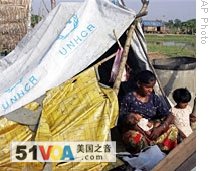Bangkok
30 April 2009
 |
| A woman feeds her baby in a makeshift tent in Twantay, south of Yangon, 30 Ap 30 2009 |
Cyclone Nargis, which struck Burma's Irrawaddy coast over May 2 and 3 last year, left more than 130,000 dead or missing. It devastated the rice-growing delta and destroyed tens of thousands of homes.
Aid organizations say that despite progress in helping communities rebuild, international aid is falling short.
David Verboom, regional head of the European Commission's European Humanitarian Aid department, said Thursday that Burma's political situation undermines international donor support.
"It is clear the political environment of course is a hindrance for many donors to contribute ... that is quite clear," he said.
Burma's military government was accused of restricting international aid right after the cyclone. Only intervention from the United Nations and regional governments led the government to give aid workers access to the hardest-hit areas.
Many governments, including the United States and the European Union, have economic sanctions against Burma's military because of its human rights violations and intolerance of dissent. The military also controls all aspects of the economy.
"From the international community side it is fair to say that support has been limited. Much more could have been done," he said.
Verboom notes that international aid after the Indian Ocean tsunami in 2004 totaled $12 billion. After Nargis, in which a similar number of people died, only about $300 million was given.
A reconstruction plan put together by the United Nations, the Association of Southeast Asian Nations and Burma's government, calls for $690 million in aid over the next three years.
But a recent U.N. appeal raised just over $315 million.
Oxfam International says urgent help is needed before June to ensure that farming and fishing families can plant crops and return to the sea.
 |
| Oxfam's Regional Director Sarah Ireland |
"Whilst I'm really heartened by what I saw a couple of months ago and communities are rebuilding their lives and getting back to some normality, what they are telling us was very much they wanted our support still," she said.
In the past year, the U.N. says food aid reached more than one million people in Burma. Other relief efforts included boosting nutrition to women and children, improving education and health services, providing emergency shelters, and water and sanitation.
But Nick Finney from Save the Children says about 500,000 people, including 200,000 children, still lack adequate shelter. Thousands still live under tarpaulins.
"People don't stand a chance in those kind of conditions and for us to be standing here one year on ? We need a reality check on the current situation where people are living in these conditions and facing a coming monsoon season and some real issues in terms of basic needs of shelter, food and water," said Finney.
Aid workers say international help in providing new housing, safe water supplies and rebuilding farms will be needed for several years before communities in the Irrawaddy delta have fully recovered.